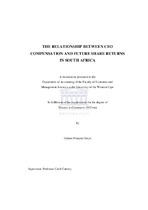| dc.description.abstract | As a result of high economic inequality, widespread discontent with excessive chief executive officer (CEO) compensation levels is acute in South Africa (SA). Some commentators argue that instead of high levels of CEO pay causing inequality, it may be part of the solution if higher levels of CEO compensation translate into better company performance, so reducing unemployment. International studies investigating the relationship between CEO short-term cash compensation and current company performance generally report a weak or no relationship where accounting based measures of performance are used. Developments in the international literature reflect a stronger relationship when long-term incentive compensation (LIC) is included and total shareholder return (TSR) used to measure company performance. However, a concerning negative association between the highest paid CEOs in terms of excess LIC and future abnormal TSR is reported. In contrast, SA pay-performance research is largely not reflective of the developments in the international literature, with local studies mostly finding no pay-performance relationship, except where size-related accounting measures are used. As a result of the strong correlation between CEO pay and company size reported in the international literature, and local studies not adequately controlling for company size, the accuracy of the conclusions drawn in prior studies on the pay-performance sensitivity relationship in SA are brought into question.
This study addresses the gaps in the SA literature by investigating the relationship between the size-adjusted excess CEO compensation and future abnormal TSR for the top 100 SA companies listed on the Johannesburg Stock Exchange for the period 2011 to 2013. A positive relationship is found between future abnormal TSR and short-term cash compensation, but not LIC. The levels and structure of CEO compensation in SA is also described. | en_US |

